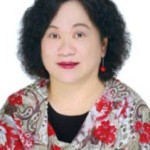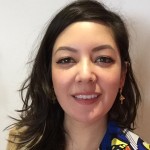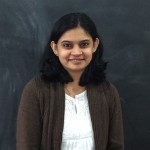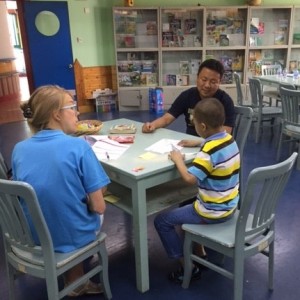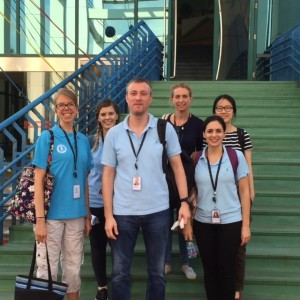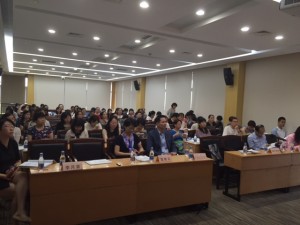
Dr. Raymond Tervo
Dr. Raymond Tervo is an American pediatrician with the Mayo Clinic in Minnesota, US, has a half a century of experience in pediatrics. His work, has included clinical research on neurodevelopment assessment, genetic testing for global developmental delay, self-injurious behaviors, and addressing problems encountered during treatment by families of children with neurodevelopmental disorders. Throughout his career, he has promoted and developed care and services for children and their families.
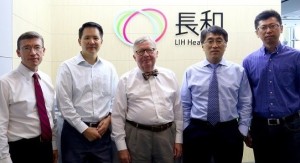
Brent Johnson, Nelson Chow, Dr. Raymond Tervo, Sun Changshen, Dr. Yu Peng
As a medical adviser for LIH Healthcare, Dr. Tervo planned a comprehensive trip during late August and early September to learn more about the state of rehabilitation in China and share his knowledge with LIH Healthcare teams as well as with numerous healthcare providers in the cities we serve. His first stop was our corporate headquarters in Beijing. There, Dr. Tervo met with President Sun Changshen, CEO Nelson Chow, COO Brent Johnson, and other senior leaders and discussed the direction of rehabilitation in China. Dr. Tervo greatly impressed the executive team with his dedication to the field of rehabilitation and profound knowledge. During his trip, Dr. Tervo visited Beijing, Shanghai, Shenzhen, and Kunming and shared his ideas and experiences with doctors, therapists, faculty and students in the areas of developmental behavioral pediatrics, pediatric neurology, pediatric health care, and pediatric rehabilitation.
In Beijing
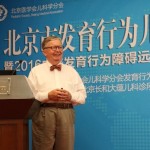 On 30 August, Beijing LIH Oliva’s Place presented together with the Pediatric Institution of Capital Medical University. Dr. Tervo gave a lecture on Child Development Delays. The lecture attracted more than 100 medical staff, including doctors, research personnel, nurses, and therapists, from medical institutions from throughout Beijing.
On 30 August, Beijing LIH Oliva’s Place presented together with the Pediatric Institution of Capital Medical University. Dr. Tervo gave a lecture on Child Development Delays. The lecture attracted more than 100 medical staff, including doctors, research personnel, nurses, and therapists, from medical institutions from throughout Beijing.
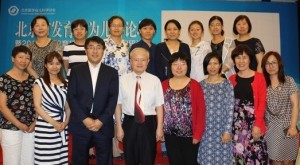 The Forum & 2016 Sino-America Behavior Development Disorder Tele-health Workshop was held by the Behavior Development Pediatric Group of Beijing Medical Society and LIH Olivia’s Place. Dr. Tervo spoke on Telehealth Coaching: Assessment and Intervention for Children with Developmental Disabilities, with professionals from more than 30 medical institution attending this lecture. During this event, Sun Changshen, President of LIH Healthcare, expressed his personal commitment and shared the company’s continued focus contributing to research in the field of developmental behavioral pediatrics in China.
The Forum & 2016 Sino-America Behavior Development Disorder Tele-health Workshop was held by the Behavior Development Pediatric Group of Beijing Medical Society and LIH Olivia’s Place. Dr. Tervo spoke on Telehealth Coaching: Assessment and Intervention for Children with Developmental Disabilities, with professionals from more than 30 medical institution attending this lecture. During this event, Sun Changshen, President of LIH Healthcare, expressed his personal commitment and shared the company’s continued focus contributing to research in the field of developmental behavioral pediatrics in China.
In Shanghai
On 3 September, Assessment and Treatment of Childhood ADHD, an activity of The 11th Shanghai Physical Medicine & Rehabilitation, was held by Shanghai Sunshine Rehabilitation Center. Dr. Tervo presented on Diagnosis and Treatment of ADHD. On the same day, Dr. Tervo also attended a seminar held by Xinhua Hospital, the affiliated hospital of Shanghai Jiaotong University, together with The First Rehabilitation Hospital and LIH Oliva’s Place. About 150 people attended the seminar, including speech therapists, physical therapists, psychologists, and parents. Nelson Chow, CEO of LIH Healthcare, attended the event at Xinhua Hospital. On behalf of the company, he expressed LIH Healthcare’s readiness to promote development within the field of pediatric rehabilitation in China. In addition to Mr. Chow, Dr. Fengyi Kuo, Occupational Therapist at LIH Olivia’s Place Shanghai, and Dr. Susan Cadzow, LIH Healthcare Director of Developmental Behavioral Pediatrics also attended the seminar.

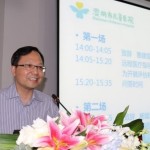
Secretary Wen, Shenzhen Children’s Hospital
In Shenzhen
On 4 September, Dr. Tervo travelled to Shenzhen to speak on Telehealth Coaching: Assessment and Intervention for Children with Development Disabilities and Development Delay Patterns. This seminar was held jointly by Shenzhen Children Hospital and Shenzhen LIH Oliva’s Place.
Secretary Wen from Shenzhen Children Hospital acted as the host and gave a warm welcome to Dr. Tervo. More than 200 people attended the forum, including pediatricians, therapists, special education teachers, students, and parents. Clinicians in attendance were mainly from the departments of rehabilitation, developmental behavioral pediatrics, psychology, and speech and language at Shenzhen Children Hospital and other hospitals in the area specializing in maternal and child health.
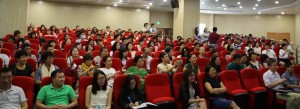
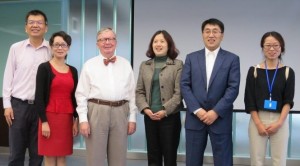 In Kunming
In Kunming
From September 6 to 7, Dr. Tervo gave four speeches at an academic forum held by Kunming LIH SkyCity Rehabilitation Hospital and Yunnan Rehabilitation Medicine Society. The four speeches were Development Screening, Development Delay Patterns, Autism, and ADHD. LIH Healthcare President Sun Changshen, Yunnan Rehabilitation Medicine Society & Rehabilitation Committee Member Professor Liu Yun, and Director George Wang of LIH SkyCity Rehabilitation Hospital were present. Attendees included clinicians from the specialties of rehabilitation, pediatrics, and child healthcare.
Research on Developmental Behavioral Pediatrics and Promoting Telehealth in China
One of Dr. Tervo’s primary focuses during his trip was Telehealth coaching: Assessment and Intervention for Children with Developmental Disabilities. He noted that telehealth standards have reached a level which compares favorably with on-site medical methods in the area of child development and behavior. Meanwhile, it can solve problems related to medical resources, distance, and affordability. Dr. Tervo expressed the hope that Chinese children can benefit from telehealth technology.
Currently, Dr. Tervo is working with University of Minnesota to promote the application of telehealth in China, and is hoping that this program can be implemented in the very near future. Meanwhile, Dr. Tervo also pointed out that research in the field of child development and behavior research in China is still at an early stage. He believes we are at a critical point for China and has expressed his willingness to contribute his own efforts to help people access better rehabilitation services.





